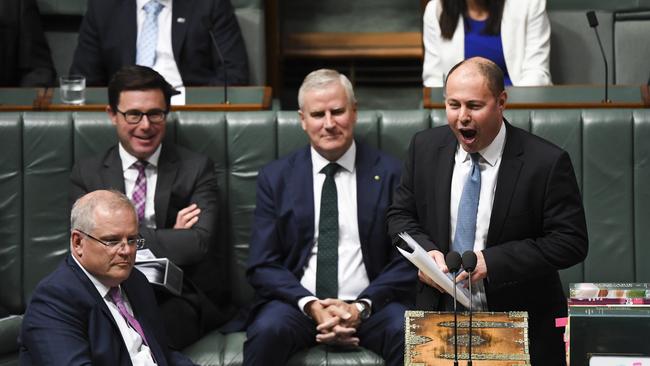
The global economic impact of the coronavirus epidemic has almost certainly wiped out the first real “back in the black” budget surplus in more than a decade and could combine with the dire domestic effects of the devastating bushfires to push Australia into a recession for the first time in 30 years.
For Scott Morrison and Josh Frydenberg, it’s no longer a case of saving political face over the loss of a budget surplus that has already been declared but of engineering an economic stimulus that stops a recession without doing long-term harm.
For the Treasurer, the failure of his burning desire to emulate Peter Costello’s budget surplus achievement more than 10 years ago could be swamped by the unwanted matching of Paul Keating’s sinking into recession.
Neither outcome is pleasant for Frydenberg nor good for the nation, but there is no doubt which is the greater evil and which bears greater political and economic cost. For months, the Coalition has been celebrating a budget surplus that was a central election campaign promise and core economic aim.
More recently, as drought and bushfires hit the budget bottom line, there has been retreat on the budget surplus, blaming the cost of recovery. Labor’s response has been that the economy was weak before the bushfires and “inaction” over stimulus from the Prime Minister and Frydenberg was to blame for the broken budget promise.
After being ridiculed for years for failing to finally deliver a declared surplus, the ALP wanted to brand Frydenberg’s “back in the black” hyperbole across his forehead. A better-than-expected December quarter growth of 0.5 per cent and 2.2 per cent for the year gave Frydenberg an out.
He was able to claim that even after the bushfires had been burning in November and December, the “resilient” Australian economy was still growing and doing better than most comparable global economies. He also said the advent of the coronavirus and the “full impact of the bushfires” would be felt in the March quarter. As Treasurer, he concentrated on the “resilience” of the economy and refused to use the term recession.
Yet the Coalition is now faced with the real prospect that the March quarter could be pushed into negative growth and Australia would be halfway towards a recession — two consecutive quarters of negative growth — before the budget.
In this context, a budget surplus would be an empty achievement if it were delivered by holding back on stimulus that is necessary for the greater task of heading off recession.
Labor’s Treasury spokesman, Jim Chalmers, is continuing to press his argument that “there’s been substantial weakness in the economy before the virus and before the fires”.
“We are in a weaker position as a country to deal with the serious challenges flowing from the outbreak of the coronavirus because of the inaction and incompetence of the Morrison government,” Chalmers said.
There’s a lot more at stake now than Frydenberg’s bid to emulate Costello.




The pivotal economic and political challenges facing the Morrison government have suddenly leapt beyond the likely failure to deliver a budget surplus in May to delivering a stimulus package that heads off a recession.